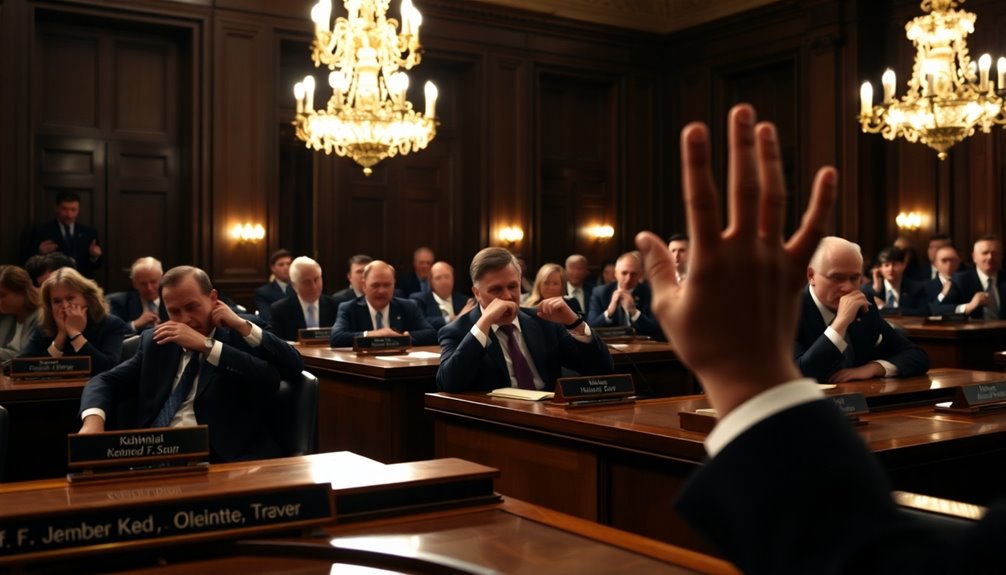The Senate's vote on Robert F. Kennedy Jr. as Secretary of Health and Human Services was intensely polarized, resulting in a 52 to 48 confirmation. Democrats united against him due to concerns about his vaccine comments and lack of health experience. Only Mitch McConnell crossed party lines to oppose him. Notable negotiations led to some Republican support, hinting at shifting alliances. Curious about how this division could shape health policy moving forward? There's plenty more to uncover.
Key Takeaways
- The Senate confirmed Robert F. Kennedy Jr. as Secretary of Health and Human Services with a narrow vote of 52 to 48, highlighting partisan divisions.
- All Democratic senators opposed Kennedy's nomination, citing concerns over his vaccine comments and lack of health administration experience.
- Mitch McConnell was the only Republican to vote against Kennedy, while Bill Cassidy and Susan Collins supported him after negotiations on health policies.
- The procedural vote preceding the final vote showed a similar partisan split with 53 in favor and 47 against Kennedy's nomination.
- Kennedy's confirmation is expected to impact public trust in health institutions and influence future health policy directions under the Trump administration.

As the Senate voted 52 to 48 to confirm Robert F. Kennedy Jr. as the Secretary of Health and Human Services, the outcome reflected deep partisan divisions. This final vote came after a procedural vote of 53 to 47, which mainly fell along party lines, showcasing how polarized the Senate has become on health-related issues.
Democrats unanimously opposed Kennedy, expressing serious concerns about his past comments on vaccines and his lack of experience in health administration.
Key senators played significant roles in shaping the vote. Mitch McConnell stood out as the only Republican to oppose Kennedy, citing his personal experience with polio and worries about Kennedy's vaccine skepticism. In contrast, Bill Cassidy voiced initial reservations but ultimately supported Kennedy after he received commitments regarding vaccine policies.
Susan Collins announced her support after Kennedy agreed to reconsider particular health research policies, demonstrating the importance of negotiation in this contentious environment.
Chuck Schumer led the Democratic opposition, arguing that endorsing Kennedy would undermine public health efforts. His concerns encapsulated the fears many had about Kennedy's history and the potential repercussions for the public's trust in health institutions.
Kennedy's past comments on vaccine safety raised alarms, and his lack of health experience fueled skepticism. Although he's an environmental lawyer and activist, critics worried he mightn't be the right fit for a position requiring extensive health administration knowledge. Kennedy's nomination faced scrutiny from both parties, indicating that his confirmation process was far from smooth.
Looking ahead, President Trump plans to establish a "Make America Healthy Again" commission, hinting at new directions in health policy.
Kennedy's commitment to collaborate with Congress on health issues and implement Trump's pro-life policies suggests a potentially contentious tenure at HHS. While Kennedy may have secured confirmation, restoring trust in public health will be a significant challenge during his leadership.
Frequently Asked Questions
What Were the Key Issues Surrounding the Robert F. Kennedy Jr. Nomination?
When considering Robert F. Kennedy Jr.'s nomination, you'll notice key issues like vaccine safety and his controversial views on public health.
His lack of healthcare experience raises doubts about his ability to lead the Department of Health and Human Services.
Many questioned his stance on chronic disease and nutrition, while concerns about misinformation gained attention.
Ultimately, these factors underscored significant political divisions surrounding health policy in the Senate.
How Do Senators' Votes Reflect Party Alignment on This Nomination?
You'll notice that senators' votes often reflect strong party alignment, especially in contentious nominations.
When a nominee stirs controversy, like with Kennedy, party loyalty typically dictates the outcome. Most Democrats oppose such nominees due to shared concerns, while Republicans often rally in support.
This division highlights how personal beliefs and party politics intertwine, influencing decision-making and showcasing the broader political landscape in the Senate.
It's a clear reflection of current partisan dynamics.
What Impact Could This Nomination Have on Future Elections?
Like the fateful choices of Shakespeare's characters, this nomination could shape the political landscape dramatically.
If Kennedy's health policies resonate with voters, you might see a shift in loyalty and turnout in upcoming elections.
Conversely, if his controversial views alienate the public, it could backfire on the Trump administration.
Ultimately, your perception of his initiatives will influence which way the political winds blow in future campaigns, making this nomination pivotal.
Were There Any Notable Speeches During the Nomination Process?
During the nomination process, several notable speeches stood out. Senator Elizabeth Warren passionately opposed Kennedy, highlighting his anti-science views.
You'd find Martin Heinrich stressing the importance of protecting public health and women's rights while questioning Kennedy's fitness for the role.
Democrats took to the Senate floor for 30 hours to express their concerns. These speeches reflected deep divisions and underscored the contentious nature of the nomination, resonating with many constituents.
How Do Public Opinions Influence Senators' Voting Decisions?
Did you know that only about 70% of senators win reelection, reflecting shifts in public opinion?
Public opinions influence senators' voting decisions primarily by shaping their electoral prospects. When constituents voice strong views, especially during election cycles, senators often feel pressured to align their votes accordingly.
Interest groups and media amplify these sentiments, creating an environment where public perception can indirectly sway legislative choices, especially in confirmation processes and key policy matters.
Conclusion
In the grand theater of politics, the senators' votes on Robert F. Kennedy Jr.'s nomination resembled a dance, each step revealing their true allegiances. Just as the tides shift with the moon, their decisions reflect deeper currents of loyalty and ambition. As you ponder their choices, consider how this performance shapes the future stage of governance. Ultimately, the echoes of their actions will resonate, guiding the next generation of leaders through the shadows of history.










